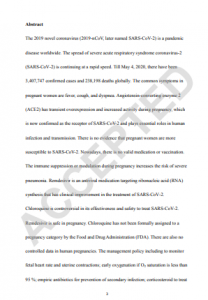
The 2019 novel coronavirus (2019-nCoV, later named SARS-CoV-2) is a pandemic disease worldwide. The spread of severe acute respiratory syndrome coronavirus-2 (SARS-CoV-2) is continuing at a rapid speed. Till May 4, 2020, there have been 3,407,747 confirmed cases and 238,198 deaths globally. The common symptoms in pregnant women are fever, cough, and dyspnea. Angiotensin-converting enzyme 2 (ACE2) has transient overexpression and increased activity during pregnancy, which is now confirmed as the receptor of SARS-CoV-2 and plays essential roles in human infection and transmission.
There is no evidence that pregnant women are more susceptible to SARS-CoV-2. Nowadays, there is no valid medication or vaccination. The immune suppression or modulation during pregnancy increases the risk of severe pneumonia. Remdesivir is an antiviral medication targeting ribonucleic acid (RNA) synthesis that has clinical improvement in the treatment of SARS-CoV-2. Chloroquine is controversial in its effectiveness and safety to treat SARS-CoV-2. Remdesivir is safe in pregnancy. Chloroquine has not been formally assigned to a pregnancy category by the Food and Drug Administration (FDA). There are also no controlled data in human pregnancies.
The management policy including to monitor fetal heart rate and uterine contractions; early oxygenation if O2 saturation is less than 95 %; empiric antibiotics for prevention of secondary infection; corticosteroid to treat maternal SARS-CoV-2 disease is not routinely, only for fetal lung maturation in selected cases; considering of delivery is according to the obstetric indication, gestational age, and severity of the disease. During epidemics, delivery at 32-34 weeks is considered.
The indication for the Cesarean section should be flexible to minimize the risk of infection during the delivery. The newborn should be in isolation ward immediately after birth; breastfeeding is not contraindicated but should avoid direct transmission infection.